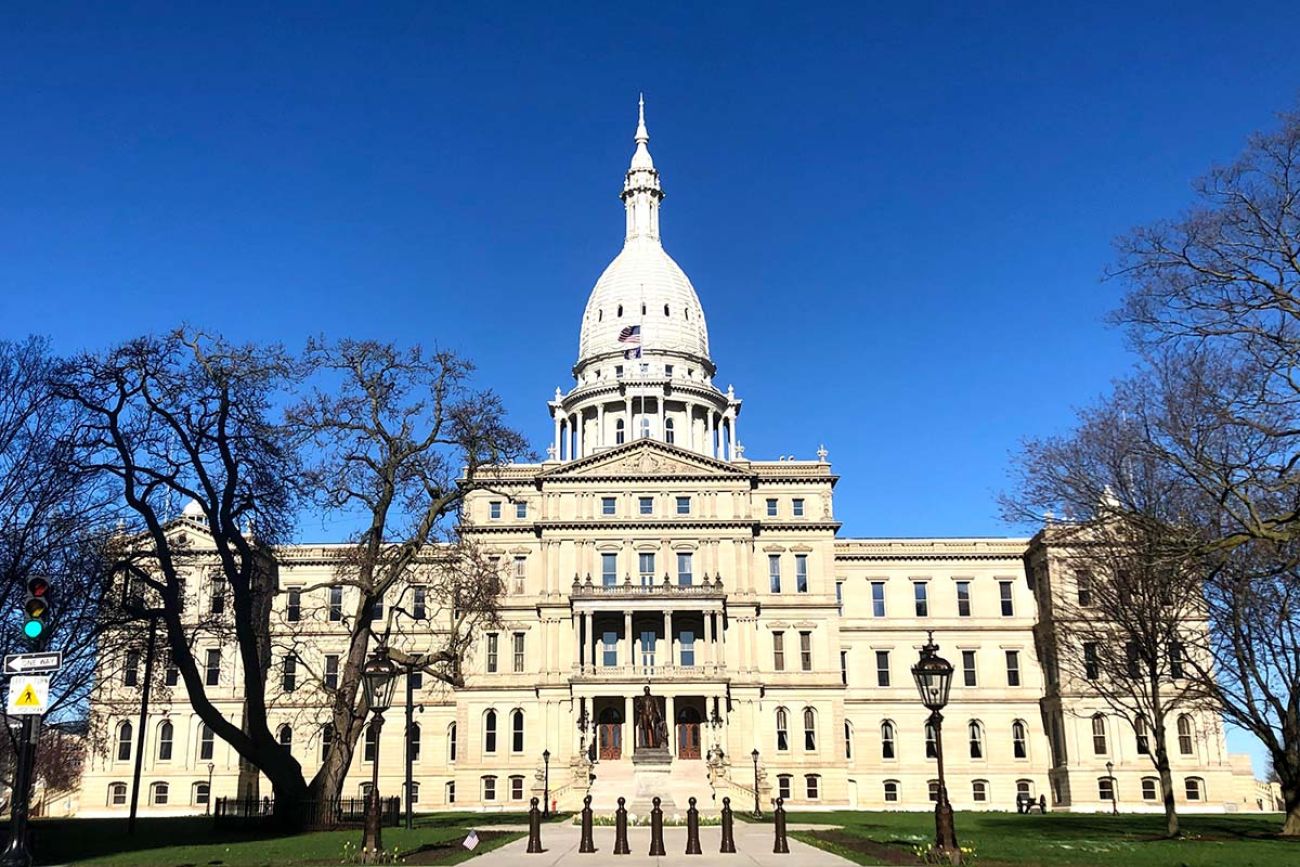With Kamala Harris, Michigan Dems seek new momentum in fight for state House

- Fight for Michigan House ramps up, with Democrats fighting to keep a narrow majority and Republicans looking to flip
- Kamala Harris’ new presidential campaign could boost Democratic base, alienate blue-collar workers in key competitive districts, analysts say
- Both parties have banked millions of dollars for the state House fight, but Republicans outraised Democrats this quarter
It's not just the presidency and competitive congressional seats on the line this fall in Michigan: Democrats are fighting to retain a precarious two-seat majority in the state House, while Republicans are equally eager to win back control.
The result could define the final two years in office for Gov. Gretchen Whitmer, who has used the past two years with a Democratic majority to pass a litany of progressive policies and spending initiatives previously blocked.
The House Republican Campaign Committee outraised the House Democratic Fund in the latest quarter, collecting just over $2 million to the Democrats’ $1.6 million, according to new campaign finance filings released Thursday.
But with a big boost this week in fundraising support from national Democratic groups, and Vice President Kamala Harris lining up support to replace President Joe Biden at the top of the ticket, House Speaker Joe Tate said he is feeling renewed optimism heading toward Nov. 5.
“I think it only improves our opportunity for growing and expanding this Democratic House,” Tate, D-Detroit, told Bridge Michigan. “I think you will see just more excitement here in Michigan.”
Related:
- Battle lines drawn in fight for Michigan House majority: What to know
- Michigan elections FAQ: Early voting starts Saturday for August primary
- Democratic voters backed Biden in Michigan primary. His exit is ‘really wild’
Harris reportedly raised a record $100 million in less than two days after Biden ended his reelection bid and endorsed her.
And on Wednesday, the Democratic Legislative Campaign Committee announced plans to spend another $1.14 million in Michigan, which committee President Heather Williams called an essential part of the “state legislative firewall” against former President Donald Trump and his allies,
Republicans remain hot on Democrats’ heels, viewing 2024 as a prime opportunity to flip the House back to Republicans and topple the party's two-seat majority. While Democrats had feared even worse under Biden, Trump has posted narrow leads over Harris in recent polls of Michigan voters.
“We don’t need a landslide in Michigan to win — we always knew this was going to be close in the state House,” said Rep. Bill G. Schuette, a Midland Republican who chairs the Michigan House Republican Campaign Committee. “We need a competitive election environment. That’s what we have.”
As of June 30, Republicans had about $7 million on hand to spend, while Democrats had roughly $6.5 million in the bank.
Recent House GOP fundraising efforts were bolstered by maximum $48,875 contributions from seven members of the DeVos family of west Michigan and political action committees linked to House Minority Leader Matt Hall.
House Democrats got maximum contributions from New York businessman George Soros, Michigan businessman Dug Song and a political action committee linked to Secretary of State Jocelyn Benson, among others.
Districts on the line
While the battle for control of the state House will be decided in November, Michigan’s Aug. 6 primary will decide who’s on the front lines.
Though nearly all districts have at least one Democrat and one Republican on the primary ballot, who wins the majority will ultimately come down to a handful of politically competitive districts that could be flippable.
In 2022, Democratic candidates won by less than 2,000 votes in six districts covering Traverse City, the West Michigan lakeshore and Battle Creek, Macomb County and Downriver communities, making those regions top targets for Republicans.
Vulnerable incumbents in those districts include Reps. Betsy Coffia, D-Traverse City; Joey Andrews, D-St. Joseph; Jim Haadsma, D-Battle Creek; Nate Shannon, D-Sterling Heights; Denise Mentzer, D-Mt. Clemens; and Jamie Churches, D-Wyandotte.
Similarly, Democrats see opportunities to flip several Republican seats in southeast Michigan swing districts, and they’re also eyeing pickups in Jackson, West Michigan and Genesee County.
Vulnerable incumbents include Reps. Donni Steele, R-Orion Township; Mark Tisdel, R-Rochester Hills; Jamie Thompson, R-Brownstown Township; and Kathy Schmaltz, R-Jackson.
Rep. David Martin, R-Davison, was expected to face a spirited challenge from former Rep. Tim Sneller, a Burton Democrat who was allowed to run again under new term limit laws.
But Sneller passed away earlier this month. His replacement, who has not yet been selected, will be chosen by the Democratic party.
The Harris effect
Competitive state House races in Michigan are often heavily impacted by what happens at the top of the ticket, meaning the historic presidential candidate shakeup could play a role in House legislative control.
Republicans officially nominated Trump and running mate JD Vance at the party’s national convention last week. Shortly after, Biden’s decision to step aside amid rampant speculation about his cognitive abilities and pressure from powerful Democrats shifted the race from a 2020 rematch into new territory.
Harris has already gained majority backing from Democratic delegates in Michigan and nationally, making her the new presumptive presidential nominee.
A new poll of Michigan voters conducted by Emerson College Polling for The Hill and WOOD TV8 showed Trump and Harris in a statistical tie, with support for Trump at 46% and support for Harris at 45%, with another 9% undecided.
It’s unclear exactly how Harris’ entrance into the race will play among Michigan voters, but at least initially, Democrats are benefiting from renewed enthusiasm among their voter base, said David Dulio, director of the Center for Civic Engagement and professor of political science at Oakland University.
“The injection of more excitement into the Democratic base is important and significant,” Dulio said, noting that a party previously facing the possibility of low turnout and lack of interest in Biden’s candidacy now has a candidate who carries broader appeal among young voters, African Americans and other groups.
“I think Harris has an opportunity to get them back in the game.”
Jamie Roe, a Republican political strategist based in Macomb County, said Democrats’ decision to nominate Harris could backfire in Michigan, where most of the competitive seats that will determine majority House control are filled with blue-collar, working class voters — a demographic where Trump “sells immensely well.”
Roe predicted voters who might have been swayed by Biden’s working class background won’t have the same connections to Harris, and he said Trump’s presence on the ticket would likely benefit Republicans further down the ballot: “His coattails here are long.”
Issues at play
Democratic candidates for state House are largely running on their record since securing the majority in 2022, marking the first time in four decades where Democrats had control of both the Legislature and the governor’s office.
In 2023, the Democratic majority worked closely with Whitmer to pass sweeping reforms, repeal Republican-backed laws and approve the largest state spending plans in Michigan history.
Their pace slowed this year, however, amid intra-party disputes and a temporary tie in the state House created when two Democrats stepped down for local positions. Democrats regained their majority in April special elections and passed a flurry of bills and a state budget in June before breaking for the summer.
Pointing to Democrats’ work to approve new tax benefits for low-income workers and seniors, gun reform and commitment to protecting abortion rights, Tate said his caucus hopes voters give them a chance to “continue to do this work in our state and increase the quality of life for residents.”
“There's going to be, in my mind, significant reverse coattails too, because what we've been able to do for the past 18 months in Lansing…is going to help the top of the ticket,” Tate said.
Schuette and other House Republicans argue many of the Democrats’ priorities, including clean energy legislation and backing of controversial economic development initiatives, will not play well with voters come fall. Changes at the top of the ticket don’t fundamentally change their approach, he said.
“We have designed an operation and campaign that’s not based on personalities,” Schuette said, “it’s based on policies.”
See what new members are saying about why they donated to Bridge Michigan:
- “In order for this information to be accurate and unbiased it must be underwritten by its readers, not by special interests.” - Larry S.
- “Not many other media sources report on the topics Bridge does.” - Susan B.
- “Your journalism is outstanding and rare these days.” - Mark S.
If you want to ensure the future of nonpartisan, nonprofit Michigan journalism, please become a member today. You, too, will be asked why you donated and maybe we'll feature your quote next time!




